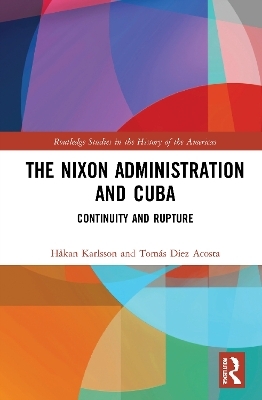
The Nixon Administration and Cuba
Routledge (Verlag)
978-0-367-75474-7 (ISBN)
This book presents a detailed analysis of the U.S. policy that was adopted toward Cuba by the Richard M. Nixon administration between January 20, 1969, and August 8, 1974. Based on governmental, as well as other, sources from both the U.S. and Cuba, this book examines the rupture where the policy of “passive containment” was complemented with a policy of “dirty war.” President Nixon attempted to reestablish a confrontational and violent path of action, and once again, Cuba was exposed to a “dirty war” consisting of different forms of aggressive terrorist activities. Since the conditions for this violent route had changed dramatically both in the U.S. and in Cuba, a policy characterized by a continuity of the economic and psychological warfare came to be the central one for the Nixon administration. This book is unique since it is written from a Cuban perspective, and it therefore complements and enriches the knowledge of the U.S.–Cuban relationship during the end of the 1960s and the beginning of the 1970s, and the policy adopted by the Nixon administration. It is of relevance to everyone interested in the issue, and especially for students and researchers within the disciplines of history and political science.
Håkan Karlsson (born 1962) is Full Professor of archeology at the Department of Historical Studies, University of Gothenburg, Sweden. He has worked with archeological, anthropological and historical investigations approaching different aspects of Cuban cultural heritage for more than 15 years. Tomás Diez Acosta (born 1946) obtained licentiate in political science and doctor of philosophy in history from the University of Havana, Havana, Cuba. He is Professor and researcher at the Instituto de Historia de Cuba, and he has published over 20 books about the relations between Cuba and the U.S.
PART I
The Context 1
1 From Saigon to Havana 3
PART II
The Nixon Administration’s Policy toward Cuba 35
2 “A Very, Very Cautious Probe Only” 39
3 CIA’s Covert Operations and the Use of Cuban Exiles 44
4 The Anti-Cuban Policy of the U.S. 53
5 Debate in the U.S. National Security Council 71
PART III
The CIA and the Secret Economic War against Cuba, and a New “Missile Crisis” (1969–1970) 79
6 The Cuban Exiles in the CIA Plans 80
7 The “Crisis” of the Soviet Nuclear Submarines 98
PART IV
Other Secret Actions toward Cuba 115
8 Psychological Warfare: Radio Broadcasts 118
9 Pirate Warfare: Harassment of Fishermen 123
10 Biological Warfare: The African Swine Fever 133
PART V
The Decline of the Counterrevolutionary Groups 145
11 The Failure of the Torriente Plan 146
12 The Crisis of the “Mother Ships” 154
13 Assassination Plots toward Fidel Castro 174
PART VI
The U.S.–Cuba Agreement on the Hijacking of Aircrafts, Sea Vessels and Other Offenses 181
14 Air and Sea Hijackings: A Double-Edged Sword for the U.S. 183
15 The Failed Negotiations between Cuba and the U.S. 199
16 The Agreement of 1973 211
PART VII
The Debacle of a President 221
17 Debates in the Congress (1973–1974) 225
18 Continued Terrorism 236
19 Watergate: Nixon’s Fall and the Cuban Connection 245
| Erscheinungsdatum | 22.12.2022 |
|---|---|
| Reihe/Serie | Routledge Studies in the History of the Americas |
| Zusatzinfo | 20 Halftones, black and white; 20 Illustrations, black and white |
| Verlagsort | London |
| Sprache | englisch |
| Maße | 152 x 229 mm |
| Gewicht | 408 g |
| Themenwelt | Geschichte ► Allgemeine Geschichte ► Zeitgeschichte |
| Geisteswissenschaften ► Geschichte ► Regional- / Ländergeschichte | |
| Sozialwissenschaften ► Politik / Verwaltung ► Europäische / Internationale Politik | |
| ISBN-10 | 0-367-75474-6 / 0367754746 |
| ISBN-13 | 978-0-367-75474-7 / 9780367754747 |
| Zustand | Neuware |
| Haben Sie eine Frage zum Produkt? |
aus dem Bereich


